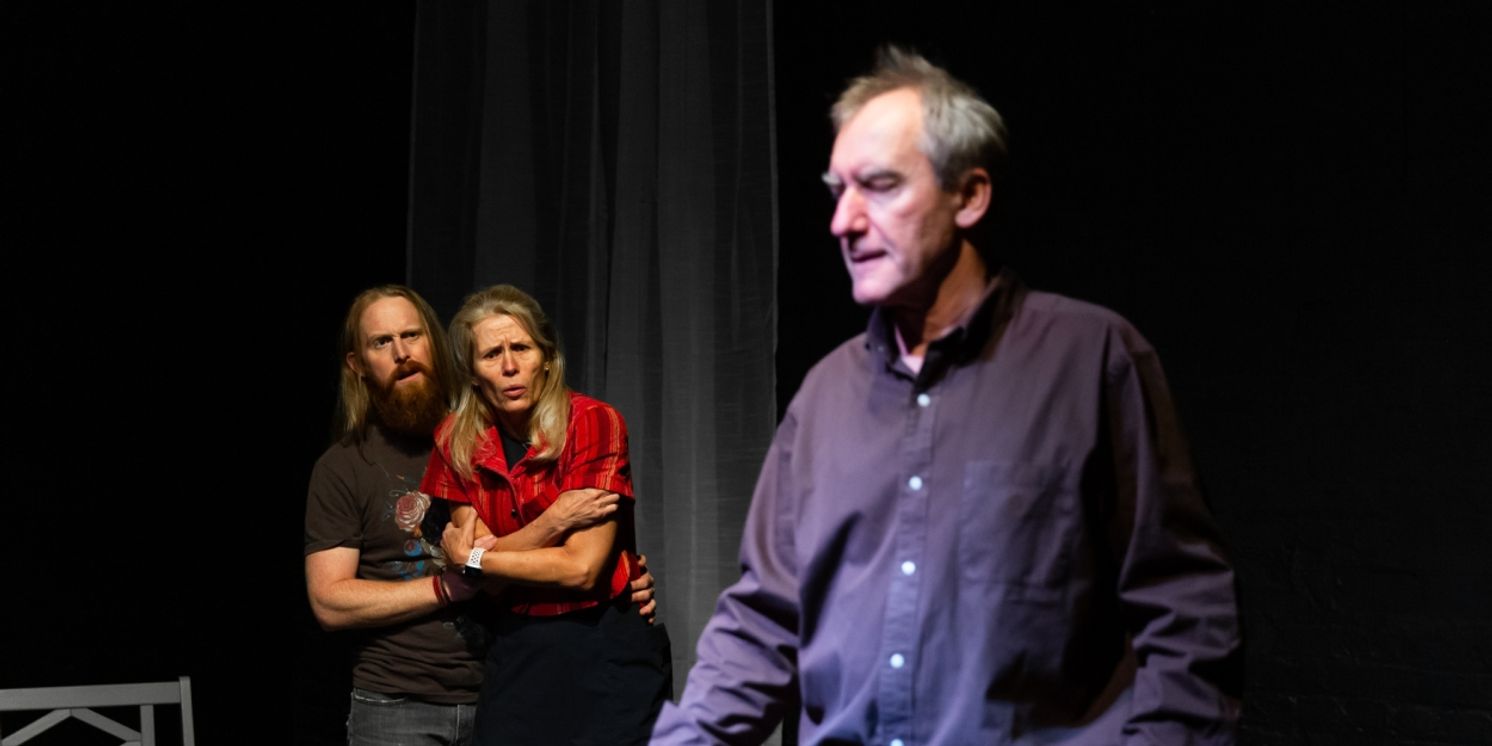Reality Crumbles But A Plot Emerges: Jon Fosse's STRONG WIND Premieres at Scena Theatre
A "Scenic Poem"

A man returns from a lengthy trip to find a suitor for his wife living in his home – an echo of the Odysseus-and-Penelope tale. That stub of a plot is pretty much the only constant in Strong Wind, 2023 Nobel Laureate Jon Fosse’s new play, receiving its first U.S. staging courtesy of Washington’s Scena Theatre. Everything else that might be plot or even mise-en-scène ("everywhere and nowhere at once") is subject to incessant revision.
When the play starts, for example, The Man (Stas Wronka), may be, or may be only discussing, staring out the window. Helpfully, images of windows are projected on the left and right walls of the set. But after The Man makes a couple of confident remarks about how there’s always something interesting out there to look at through the window, an uncertainty emerges: is it the left window or the right? In fact, is there or was there even a window at all? Underscoring that lack of certainty, the projected windows vanish. The weather keeps changing, too: is it dark and windy, or pleasant? Welcome to Fosse-land.
In Fosse-land, one can expend much time and effort expatiating on the concepts of “now” and “blinking” versus “winking.” The talk is endlessly recursive, expressed in vocabulary limited enough (probably) to qualify for one of the Dick-and-Jane elementary school readers that older theatergoers may remember. Yet somehow boredom never sets in. Despite, and doubtless because of, all its repetition and its limited vocabulary, the dialogue is poetic and moving, similar in effect to the recursions of a minimalist musical composition, Terry Riley’s In C, for instance. Indeed, Strong Wind is subtitled as “A Scenic Poem.”
The Man’s obsessions, it eventually emerges, do have a point and an object: his dismay at the discovery that while The Man was away, his wife, The Woman (Sissel Bakken), has taken a lover, The Young Man (Robert Sheire). This is not exactly a conventional story of infidelity, betrayal, guilt, jealousy and recrimination, however. This is less elaborate: The Man is simply struggling to conceptualize what is clearly going on before his eyes. (Well, fairly clearly; as The Young Man lies on the floor and gnaws The Woman’s toes, for instance, it’s clearly an enacted fetish, but is she enjoying it or not? We can’t quite tell for sure.) The Man’s responses to this alarming tableau are more like the incidentals of a dream than of an awake mind: repeatedly inquiring what is the meaning of what he is seeing, and explaining to The Young Man, as one might to a fellow-traveler who has mistakenly taken one’s airplane seat, that his wife is with The Man, and that therefore the Young Man will have to go. This directive has little effect on the Young Man, though the Young Man does suggest, seemingly as an accommodation, that The Man can stay and touch himself during The Woman’s erotic play with the Young Man, and satisfy his claims that way.
There will be no accommodation, however. Instead, the end is marked by strong hints of a more distressing and dramatic resolution of this unstable triangle.
The ending of this show, conclusive or not, comes pretty quickly. With a running time of only about sixty minutes, the play will not wear out its welcome. Indeed, on press night, which was also opening night, the audience remained fully engaged throughout, and erupted in cheers at the curtain calls. As the audience’s response confirmed, this is an exciting play, and well worth the effort to attend.
I make that last point in full awareness that Baltimore theatergoers, my primary readers, will indeed need to make an effort to attend. The DC Arts Center, where this show is being presented, poses a typical degree of difficulty. It sits in the Adams Morgan district, and it’s hard for Baltimore drivers to reach at rush hour, nor is it particularly close to any Metro stop. Despite such challenges, in my reviews over the years I’ve often sampled Washington’s theatrical riches, including Scena’s, because Washington is tantalizingly close, and, especially in this post-pandemic moment, its theater scene is livelier than Baltimore’s. (To be blunt.) Usually, Scena locates its shows more accessibly to Baltimore drivers, on the H Street, NE corridor, at or near the Atlas Performing Arts Center, and I understand upcoming Scena shows will be back in that vicinity.
But even being offered where it is, this play is worth making that effort to see. Scena productions are never mere theatrical comfort food; they generally have classical or European roots and, whether comic or tragic, they are always intellectually serious affairs, out to show us or make us think about interesting matters. And this show is no exception. With not only Fosse’s fine script and well-thought-through performances and direction (by company founder Robert McNamara, who usually directs Scena productions), not to mention, in this case, striking sound design by Denise Rose, the show packs a wallop.
Even the location has its upside. This stretch of Adams Morgan is jammed with unique, varied restaurants sitting cheek-by-jowl with each other, and there’s a nearby parking structure. Just plan to make an evening of it. I’d add that the DC Arts Center is a good little house (40-odd steeply-raked seats, outstanding acoustics, decent lighting, although, n.b., minus restrooms at the moment, due to construction, though the restaurants downstairs are reportedly willing to accommodate). So warm up your GPSs and drive on down.
Strong Wind, by Jon Fosse, translated by May-Brit Akerholt, directed by Robert McNamara, presented by Scena Theatre through November 26, 2023 at DC Arts Center, 2438 18th Street Northwest, Washington, DC 20009. Tickets $38.25 (fees may also apply), at scenatheatre.org. Sexual situations and topics.
Photo credit: Jae Yee Photography.
Videos

